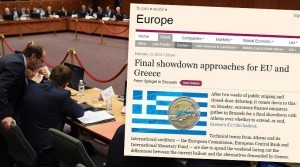In an article entitled “Final showdown approaches for EU and Greece,” Peter Spiegel, the sharp correspondent for the Financial Times in Brussels, presents three possible scenarios with regard to the negotiations between Greece and its creditors, in view of a critical Eurogroup meeting on Monday.
According to the British financial daily, technocrats from Athens and the Troika of the country’s creditors (the EC, the ECB and the IMF) will spend the weekend negotiating “over whether to extend, or end, Greece’s €172bn bailout.”
The (roughly) three possible scenarios with regard to the outcome are the following:
An extension
Spiegel characterizes this as the “preferred option of Brussels and Berlin.”
However, it is not very likely that the Greek side will accept this scenario, and definitely not the word “extenion” in any joint statement.
To explain why, the FT correspondent cites a senior Greek official who reportedly said that “you cannot ask a newly elected government that has been elected with a mandate for a new program to implement the previous [bailout] as a precondition for discussion.”
A ‘bridge’
This is the Greek Finance Minister Yanis Varoufakis’s proposal. However, the probability that it will become accepted by Greece’s European partners is almost zero, argues Spiegel — semantics aside.
Expiry and new talks
“Some troika members argue that as long as talks are under way for a new bailout, investors will be willing to give the eurozone more time to get its ‘Greek house’ in order, if the current programme ends in two weeks,” the article concludes.
According to the FT, this is the most likely scenario, and the best solution available, if the Greek government “sticks to its guns” and EU officials continue to reject the “bridge” option.
Ask me anything
Explore related questions





